
-
Company
-
Sectors

-
IT solutionsIT solutions
-
Cybersecurity
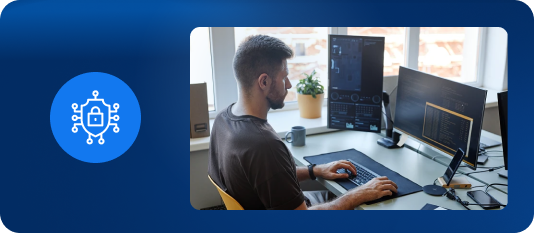
-
IT infrastructure
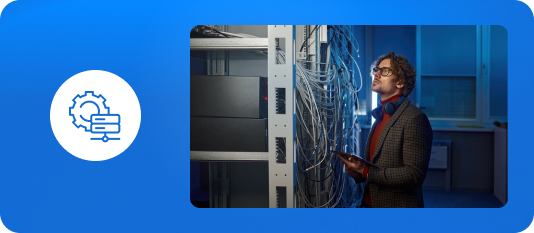
- Apollo ECI
- Data Center
- ECI Telecom
- Neptune ECI
- LAN and WiFi network systems
- Hosting services
- Backup systems
- OT network systems
- IT consulting
- Servers, arrays, networks
- Outsourcing services
- Guaranteed power supply systems
- Low-current installations
- Computer and printing equipment
- Service contracts
- Cloud services
- Virtualization
-
ERP and BI systems
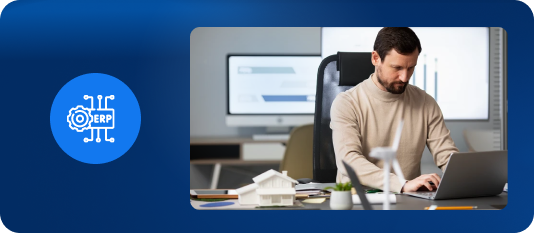
-
Systems for production
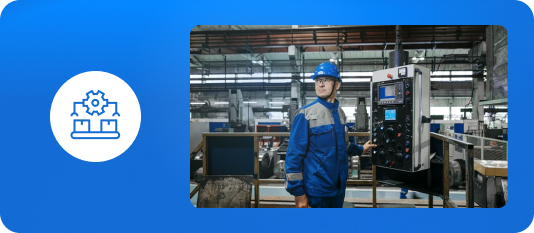
-
Warehouse management systems (WMS)
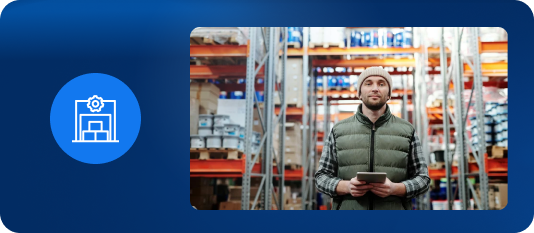
-
Personnel and HR systems

-
Systems for universities
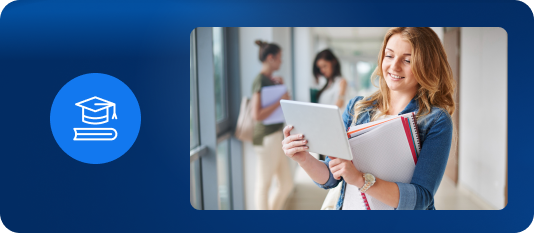
- University Study Management System
- Teta EDU
- Student e-file
- Online Candidate Registration
- OPTiDrop App
- Student Extranet
- Electronic Attendance List
- System of Academic Career Offices
- Electronic Room Reservation System
- OPTicamp academic teacher electronic ID card
- OPTicamp electronic PhD student ID card
- OPTicamp electronic student ID
-
Workflow and applications
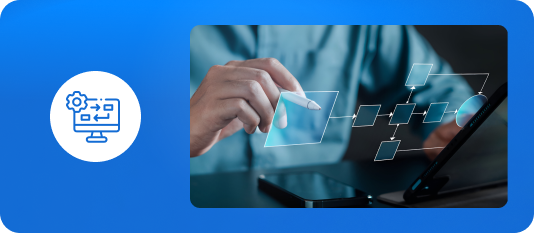
-
CMS system and websites

-
Chatbots

-
Web platforms and applications
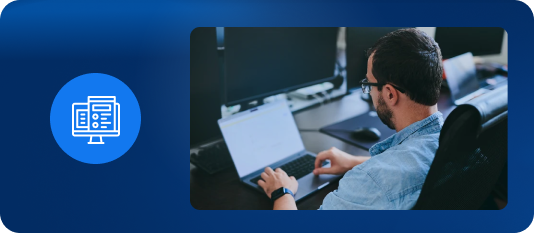
-
Other technologies
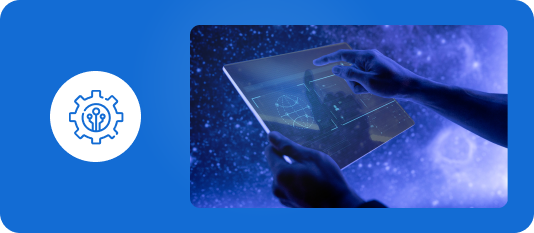

-
-
Knowledge
-
Contact
E-learning platform
A Modern Remote Learning Platform
The e-learning platform is a functional tool that enables students to achieve their learning goals remotely, via the internet, without having to attend classes at a specific location and time. This makes it a perfect complement to the traditional academic education model, providing a convenient form of teaching for faculty and learning for students. As a convenient and flexible solution, it allows for the interactive and engaging classes offered by a digitally accessible university.


E-learning offers interactive lectures, exercises, and other activities
Configure individual profiles for students from all majors.
Create a dedicated learning path for each student.
Create and add ready-made teaching materials in any format.
Set lesson publication times and automatic reminders.
Create and administer tests by category.
Monitor the material being covered based on reports on time spent on the platform.
Monitor and assess learning progress.
Calendar with important events, discussion forum, and noticeboard.
Internal communication channels between students and instructors.
A functional tool for remote academic education

Effective Online Study
Distance Learning is a flexible approach to the educational process that does not require face-to-face meetings between students and lecturers. Students can complete specific coursework online and, as a result, receive a credit for the selected course, earning them the ECTS credits needed to complete the year. The e-learning platform is a tool fully adapted to the requirements of the academic learning process based on the ECTS credit system. It allows for the completion of a specified number of selected classes included in the curriculum and study plan online.
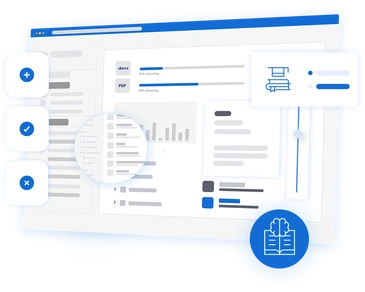
An Interactive and Convenient Form of Learning
The delivery of complete classes and exams is facilitated by a range of E-Learning Platform modules, managed from the administration panel (LMS/CMS), which can be freely configured and used. Classes are conducted using a variety of teaching materials – texts, multimedia files (audio files, videos, animations), interactive exercises, quizzes, tests, and much more. Special functionalities allow for the assessment of student knowledge and evaluation of learning outcomes. The platform allows for additional consultations with the instructor via built-in communication tools.
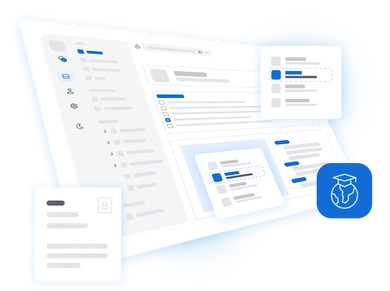
Access to classes and materials from anywhere
Remote learning via the E-learning Platform is available to those registered in the system. Only students with accounts gain access to teaching materials, which they can access on any computer or mobile device without the need to install additional software. The solution includes features for people with disabilities. The visual design of the E-learning Platform (logo, colors, graphic elements) can be customized to match the university's website and channels.
E-learning that meets the expectations of students and universities
The e-learning platform can be integrated with dean's office systems, the Electronic Student ID, the Electronic Doctoral Student ID, the ERP system, and document management. This makes it an integral part of the university's infrastructure, streamlining the management of educational processes.
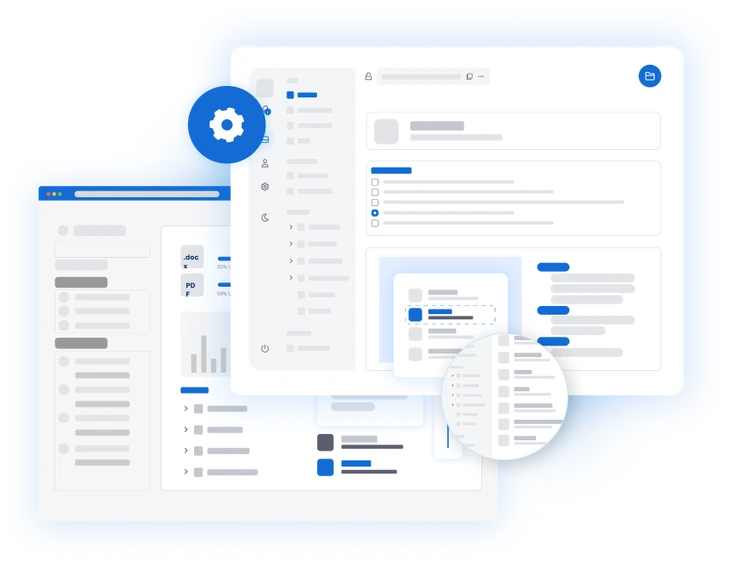
SCORM
The SCORM standard allows for importing pre-prepared classes into the system.
Configurability
The platform can be customized with modules and functionalities to suit the classes and university needs.
Material Formats
Learning materials in popular formats that enhance class interactivity.
Integration
Mechanisms that ensure the interoperability of the e-learning platform with existing university systems.
See the benefits of an e-learning platform for students and universities
Educate large groups without the need for on-site classes.
Students have constant access to teaching materials.
Independent creation of innovative educational materials by the instructor.
A flexible form of education tailored to individual student preferences.
The ability to create a large number of customized educational activities.
Ongoing monitoring of student learning progress.
Verification of learning outcomes through generated tests and reports.
Fast transfer of knowledge in an interactive format.
Support for traditional teaching in line with the concept of a digitally accessible university.

E-learning as a component of universities' digital competencies
The e-learning platform supports the higher education process by facilitating remote and hybrid learning, as well as student self-pacing, as a complement to the traditional approach to studying. It enables the use of modern technologies such as multimedia, online tests, and interactive materials, which increases engagement and learning effectiveness. E-learning supports the continuity of education in complex situations, allowing universities to expand their teaching offerings and respond flexibly in the event of dropouts.
Want to know more? Contact us
Let us know your needs and expectations, and our consultant will contact you. Together, we'll choose the best solutions for your business.
Polityka prywatności
Klauzula Informacyjna - przetwarzanie danych osobowych w OPTeam S.A.
Ochrona prywatności użytkowników Internetowych serwisów OPTeam SA jest dla nas bardzo ważna.
Niniejsza polityka zawiera informacje dotyczące gromadzonych danych oraz zasad ich przetwarzania i wykorzystywania we wszystkich serwisach www prowadzonych i utrzymywanych przez OPTeam SA. Wykorzystanie i zbieranie informacji o użytkownikach Internetowych serwisów ograniczane jest do niezbędnego minimum wymaganego do świadczenia przez OPTeam SA usług na najwyższym poziomie. Polityka prywatności zawiera informacje na temat narzędzi stosowanych przez OPTeam SA w celu zapewnienia jak największej wygody korzystania z Internetowych serwisów (cookies, logi systemowe) oraz o danych zbieranych przez podmioty zajmujące się analityką serwisów. Polityka określa ponadto w jaki sposób chronimy Twoje dane, jakie prawa Ci przysługują oraz w jaki sposób możesz je wykonywać. Jednocześnie wskazane zostały narzędzia służące do zarządzania wyrażonymi przez Ciebie zgodami.
Jakie dane zbieramy?
OPTeam dokłada wszelkich starań, żeby Internetowe serwisy informacyjne były wygodne w użyciu. Dla zwiększenia wydajności serwisów stosowana jest technologia anonimowych cookies oraz pobierane są dane statystyczne o najczęściej poszukiwanych, za pomocą wyszukiwarki frazach, dzięki czemu aktualizowana jest na bieżąco nawigacja serwisu, żeby wyszukiwanie treści było wygodne i intuicyjne.
Przetwarzamy dane, żeby:
- dopasować prezentowane treści do potrzeb i zainteresowań użytkowników,
- zapewnić bezpieczeństwo usług,
- prezentować informacje o produktach i usługach dopasowane do potrzeb i zainteresowań użytkowników,
- dokonywać pomiarów, które pozwalają udoskonalać oferowane produkty i usługi.
Cookies (ciasteczka).
Serwis nie zbiera w sposób automatyczny żadnych informacji, z wyjątkiem informacji zawartych w plikach cookies.
- Pliki cookies (tzw. "ciasteczka") stanowią dane informatyczne, w szczególności pliki tekstowe, które przechowywane są w urządzeniu końcowym Użytkownika Serwisu i przeznaczone są do korzystania ze stron internetowych Serwisu. Cookies zazwyczaj zawierają nazwę strony internetowej, z której pochodzą, czas przechowywania ich na urządzeniu końcowym oraz unikalny numer.
- Podmiotem zamieszczającym na urządzeniu końcowym Użytkownika Serwisu pliki cookies oraz uzyskującym do nich dostęp jest OPTeam SA, Tajęcina 113, 36-002 Jasionka.
- Pliki cookies wykorzystywane są w celu:
- dostosowania zawartości stron internetowych Serwisu do preferencji Użytkownika oraz optymalizacji korzystania ze stron internetowych; w szczególności pliki te pozwalają rozpoznać urządzenie Użytkownika Serwisu i odpowiednio wyświetlić stronę internetową, dostosowaną do jego indywidualnych potrzeb;
- tworzenia statystyk, które pomagają zrozumieć, w jaki sposób Użytkownicy Serwisu korzystają ze stron internetowych, co umożliwia ulepszanie ich struktury i zawartości
- utrzymanie sesji Użytkownika Serwisu (po zalogowaniu), dzięki której Użytkownik nie musi na każdej podstronie Serwisu ponownie wpisywać loginu i hasła.
- W ramach Serwisu stosowane są dwa zasadnicze rodzaje plików cookies: "sesyjne" (session cookies) oraz "stałe" (persistent cookies). Cookies "sesyjne" są plikami tymczasowymi, które przechowywane są w urządzeniu końcowym Użytkownika do czasu wylogowania, opuszczenia strony internetowej lub wyłączenia oprogramowania (przeglądarki internetowej). "Stałe" pliki cookies przechowywane są w urządzeniu końcowym Użytkownika przez czas określony w parametrach plików cookies lub do czasu ich usunięcia przez Użytkownika.
- W ramach Serwisu stosowane są następujące rodzaje plików cookies:
- "niezbędne" pliki cookies, umożliwiające korzystanie z usług dostępnych w ramach Serwisu, np. uwierzytelniające pliki cookies wykorzystywane do usług wymagających uwierzytelniania w ramach Serwisu;
- pliki cookies służące do zapewnienia bezpieczeństwa, np. wykorzystywane do wykrywania nadużyć w zakresie uwierzytelniania w ramach Serwisu;
- "wydajnościowe" pliki cookies, umożliwiające zbieranie informacji o sposobie korzystania ze stron internetowych Serwisu;
- "funkcjonalne" pliki cookies, umożliwiające "zapamiętanie" wybranych przez Użytkownika ustawień i personalizację interfejsu Użytkownika, np. w zakresie wybranego języka lub regionu, z którego pochodzi Użytkownik, rozmiaru czcionki, wyglądu strony internetowej itp.;
- "reklamowe" pliki cookies, umożliwiające dostarczanie Użytkownikom treści reklamowych bardziej dostosowanych do ich zainteresowań.
- W wielu przypadkach oprogramowanie służące do przeglądania stron internetowych (przeglądarka internetowa) domyślnie dopuszcza przechowywanie plików cookies w urządzeniu końcowym Użytkownika. Użytkownicy Serwisu mogą dokonać w każdym czasie zmiany ustawień dotyczących plików cookies. Ustawienia te mogą zostać zmienione w szczególności w taki sposób, aby blokować automatyczną obsługę plików cookies w ustawieniach przeglądarki internetowej bądź informować o ich każdorazowym zamieszczeniu w urządzeniu Użytkownika Serwisu. Szczegółowe informacje o możliwości i sposobach obsługi plików cookies dostępne są w ustawieniach oprogramowania (przeglądarki internetowej).
- Operator Serwisu informuje, że ograniczenia stosowania plików cookies mogą wpłynąć na niektóre funkcjonalności dostępne na stronach internetowych Serwisu.
- Pliki cookies zamieszczane w urządzeniu końcowym Użytkownika Serwisu i wykorzystywane mogą być również przez współpracujących z operatorem Serwisu reklamodawców oraz partnerów.
- Więcej informacji na temat plików cookies dostępnych jest pod adresem www.wszystkoociasteczkach.pl lub w sekcji "Pomoc" w menu przeglądarki internetowej.
- Strona korzysta z narzędzi analitycznych Google Tag Manager należących do Google LLC, 1600 Amphitheatre Parkway, Mountain View, CA 94043, Stany Zjednoczone, które pozwalają monitorować działania (tzw. zdarzenia) wykonywane przez Ciebie podczas wizyty na Stronie, takie jak np.: kliknięcie w przycisk, przesłanie formularza kontaktowego, pobranie pliku. W tym celu wykorzystywane są pliki cookies Google LLC dotyczące usługi Google Tag Manager. Szczegółowe informacje związane z przetwarzaniem danych przez Google Analytics są udostępnione przez Google na stronie: https://support.google.com/tagmanager/answer/9323295?hl=pl.
- Strona korzysta z narzędzi analitycznych Google Analytics należących do Google LLC, 1600 Amphitheatre Parkway, Mountain View, CA 94043, Stany Zjednoczone, które zbierają informacje na temat Twoich odwiedzin Serwisu, takie jak: wskazanie stron, które wyświetliłeś, czas, jaki spędziłeś na stronie czy przejścia pomiędzy poszczególnymi stronami. W tym celu wykorzystywane są pliki cookies Google LLC dotyczące usługi Google Analytics. Szczegółowe informacje związane z przetwarzaniem danych przez Google Analytics są udostępnione przez Google na stronie: https://support.google.com/analytics/answer/6004245.
- Strona korzysta z narzędzi analitycznych Google Search Console należących do Google LLC, 1600 Amphitheatre Parkway, Mountain View, CA 94043, Stany Zjednoczone, które pomagają monitorować, utrzymywać i rozwiązywać problemy związane z obecnością witryny w wynikach wyszukiwania Google. Szczegółowe informacje związane z przetwarzaniem danych przez Google Search Console są udostępnione przez Google na stronie: https://support.google.com/webmasters/answer/9128668?hl=pl. Wszelkie pozostałe informacje związane z prywatnością i bezpieczeństwem danych gwarantowanych przez Google, można znaleźć pod adresem: https://policies.google.com/privacy?hl=pl.
- Serwis korzysta z narzędzia analitycznego HotJar należącego do HotJar, Level 2, St Julian’s Business Centre 3, Eliza Zmmit Street, St Julian’s ST 1000, Malta, które śledzi Twoje zachowanie podejmowanie w obrębie Serwisu. W tym cellu wykorzystywane sa pliki cookies. Z pomocą HotJar analizowane są zachowania Użytkownika, tj. czas spędzony na poszczególnych stronach, przyciski, w które klika, linki, z których korzysta itp. Więcej informacji odnajdziesz w polityce prywatności HotJar: https://www.hotjar.com/legal/policies/privacy.
- Z narzędzia lead generation Bazo, które identyfikuje ruch na stronie (wizyty na podstronach serwisu). Narzędzie należy do Bazo Sp. z o.o., ul. Bohdana Dobrzańskiego 3, 20-262 Lublin, Regon: 364959893, NIP: 9462661611. Szczegółowe informacje związane z przetwarzaniem danych przez Google Analytics są udostępnione przez Google na stronie: https://bazo.io/pl/polityka-prywatnosci.
- Menadżera Kampanii LinkedIn, systemu reklamowego należacego do Microsoft z siedzibą Redmond, WA 98052-7329 USA. Więcej informacji odnajdziesz w polityce prywatności: https://www.linkedin.com/legal/privacy-policy?trk=homepage-basic_footer-privacy-policy.
- Menadżera Reklam Meta, systemu reklamowego należącego do Facebooka z siedzibą 1 Hacker Way, Menlo Park, CA 94025. Więcej informacji odnajdziesz w polityce prywatności: https://www.facebook.com/privacy/policy/?entry_point=facebook_help_center_ig_data_policy_redirect&locale=pl_PL.
Logi systemów.
Logi systemów, czyli rejestr zdarzeń - utworzony w chronologicznej kolejności zapis informacji o zdarzeniach i działaniach dotyczących strony WWW. Zawierają one takie dane jak adres IP, z którego nastąpiło wejście na daną podstronę, adres tej strony oraz czas połączenia. Logi systemów wykorzystywane są przez OPTeam SA w szczególności w celach statystycznych oraz monitorowania bezpieczeństwa.
Zmiany w polityce ochrony prywatności Internetowych Serwisów Informacyjnych OPTeam.
Na zmiany w Polityce prywatności Internetowych serwisów OPTeam może wpłynąć zmiana technologii internetowej, zmiany powszechnie obowiązujących przepisów prawa, w tym w zakresie ochrony danych osobowych.
Zmiany polityki będą zamieszczane pod adresem http://www.opteam.pl/polityka-prywatnosci.
WŁĄCZANIE / USUWANIE / BLOKOWANIE PLIKÓW COOKIES W INTERNETOWYCH SERWISACH OPTEAM SA.
Internetowe serwisy OPTeam SA korzystają z plików cookies zgodnie z dokonanymi indywidualnie przez Użytkownika ustawieniami przeglądarki internetowej. W wielu przeglądarkach obsługa plików cookies jest domyślnie włączona. Korzystanie z Internetowych serwisów OPTeam SA, bez zmiany ustawień w przeglądarce dotyczących cookies, oznacza potwierdzenie zapoznania się z powyższymi informacjami i akceptację plików cookies. Jeżeli Użytkownik nie akceptuje plików cookies może w dowolnym momencie, w swojej przeglądarce internetowej, zmienić ustawienia lub wyłączyć obsługę plików cookies.
Korzystanie z Internetowych serwisów informacyjnych z włączoną obsługą plików cookies w przeglądarce oznacza, że pliki te zapisane będą w pamięci urządzenia użytkownika.
Więcej informacji na temat plików cookies dostępnych jest w sekcji „Pomoc” w menu przeglądarki internetowej użytkownika lub na poniższych stronach.
- Cookies w przeglądarce Chrome
- Cookies w przeglądarce Firefox
- Cookies w przeglądarce Opera
- Cookies w przeglądarce Safari
- Cookies w przeglądarce Internet Explorer
Użytkownicy, którzy po zapoznaniu się z informacjami dostępnymi w Internetowych serwisach informacyjnych, nie chcą żeby pliki cookies pozostały zachowane w przeglądarce internetowej urządzenia, powinni usunąć je ze swojej przeglądarki po zakończeniu wizyty w Internetowym serwisie informacyjnym.
ADMINISTRATOR DANYCH OSOBOWYCH.
Administratorem danych osobowych jest OPTeam S.A. z siedzibą w Tajęcinie, adres: Tajęcina 113, 36-002 Jasionka w Sądzie Rejonowym w Rzeszowie, XII Wydział Gospodarczy Krajowego Rejestru Sądowego, pod numerem KRS 0000160492, NIP: 813-03-34-531, REGON: 008033000, kapitał zakładowy (kapitał wpłacony) 730 000 zł, Inspektor Ochrony Danych.
W OPTeam S.A. został powołany Inspektor Ochrony Danych, adres: Inspektor Ochrony Danych, Tajęcina 113, 36-002 Jasionka, adres e-mail: odo@opteam.pl.
Udostępnienie danych klienta.
OPTeam SA nie udostępnia danych powiązanych z plikami cookies żadnym podmiotom zewnętrznym.
Purpose
Consent
Necessary cookies help make a website usable by enabling basic functions such as page navigation and access to secure areas of the website. The website cannot function properly without these cookies.
Functional cookies help the website function properly and ensure that the information you need is displayed quickly and accurately when you visit the website.
Statistical cookies help website owners understand how different users behave on the site by collecting and reporting information anonymously.
Marketing cookies are used to track users across websites. The goal is to display advertisements that are relevant and interesting to individual users and therefore more valuable to publishers and third-party advertisers.